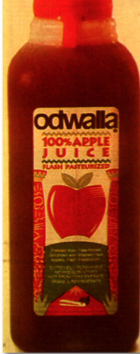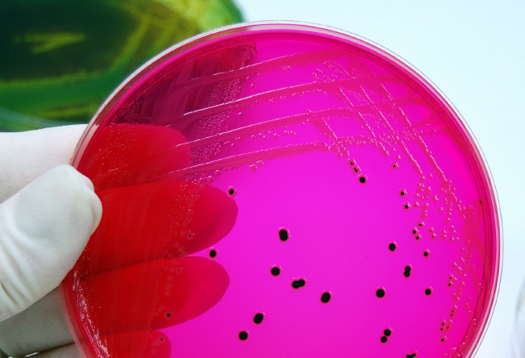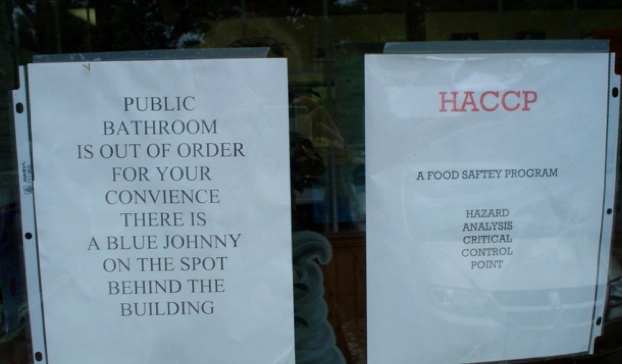Michelle Marcotte (bottom, exactly as shown), an ex-pat Canadian and regulatory affairs consultant based in Glenn Dale, Maryland, who has worked in 40 countries, eaten well, but carefully, and never been sick, writes:
 My husband was born lacking the barbecue gene on his Y chromosome; so it is up to me to either cook or fetch barbecue. Here, in the steam bath that is Maryland in the summer, sensible people fetch barbecue from a roadside truck or trailer.
My husband was born lacking the barbecue gene on his Y chromosome; so it is up to me to either cook or fetch barbecue. Here, in the steam bath that is Maryland in the summer, sensible people fetch barbecue from a roadside truck or trailer.
Barbecue is slow cooked pork ribs, chicken or brisket. It is cooked over a wood flame, on a grill. The grill is placed down the length of a converted home heating oil tank which has been turned on its side, cut open and hinged to form a lid. When the lid of the tank is down, the resulting oven is as hot as hell.
Since barbecue is a necessity of life, I watch for a smoking truck or van parked by the side of the road. A line of cars parked on the verge and the intoxicating smell of barbecue are evidence of other barbecue-addicted persons getting a hit.
So, this week, while waiting for my whole chicken to slowly cook, I thought to observe the food safety of these itinerant barbecue kings. It is a two-person operation: the cook and the boss. You give your order to the boss and he yells to the cook to start the selection process. You stand in line and wait, unable to speak because your mouth is watering.
.jpg) The cook uses a very long-handled fork to move the dripping raw, marinated meat from the cooler to the grill and then, using exceptional genius, moves the meat around the flame, placing it in various positions sufficient to result in slow-cooked deliciousness. The raw meat and chicken juice drips on the almost done and finished cooked meat on the grill. But, after each addition of raw meat, that lid comes down for a few minutes, the smoke comes up, the heat waves distort the air for 4-5 feet above the tank. I pray it is enough to kill the bacteria spread from the raw chicken over the cooked meat.
The cook uses a very long-handled fork to move the dripping raw, marinated meat from the cooler to the grill and then, using exceptional genius, moves the meat around the flame, placing it in various positions sufficient to result in slow-cooked deliciousness. The raw meat and chicken juice drips on the almost done and finished cooked meat on the grill. But, after each addition of raw meat, that lid comes down for a few minutes, the smoke comes up, the heat waves distort the air for 4-5 feet above the tank. I pray it is enough to kill the bacteria spread from the raw chicken over the cooked meat.
The boss takes his long handled fork and spears the meat that the cook has placed on the front of the grill. He whacks it down on the cutting board that has been in use from early morning. He puts disposable gloves on, and chops the chicken into quarters, the ribs into halves and the brisket into slices. He places it all in a foil-lined Styrofoam take-out box. He slathers it with barbecue and hot sauce. He then takes the gloves off, takes your money, puts new gloves on and starts over with the next customer.
In this scenario there was no handwashing, not even a pretense of handwashing. There was no tub of water on the trailer. The nearest meat thermometer is 10 miles away. And that’s how it is when you have a barbecue addiction. You take risks.
.jpg) You take the barbecue home and eat it promptly, praying to the foodsafety gods
You take the barbecue home and eat it promptly, praying to the foodsafety gods
 being escorted out.
being escorted out.
 visits related to gastrointestinal illness involving salmonella and one other unspecified type of bacteria.
visits related to gastrointestinal illness involving salmonella and one other unspecified type of bacteria. Center butchering event held Jan. 27 at the Mount Pleasant Ruritan Club.
Center butchering event held Jan. 27 at the Mount Pleasant Ruritan Club. Department Laboratory and did contain salmonella.
Department Laboratory and did contain salmonella. O157:H7. Investigators believe that some of the apples used to make the cider may have been insufficiently washed after falling to the ground and coming into contact with deer feces.
O157:H7. Investigators believe that some of the apples used to make the cider may have been insufficiently washed after falling to the ground and coming into contact with deer feces. the death was from other complications.
the death was from other complications. asked: "Did you serve the cider heated because you heard about other outbreaks and were concerned about liability?"
asked: "Did you serve the cider heated because you heard about other outbreaks and were concerned about liability?" Michael Chappell, acting associate commissioner for regulatory affairs at FDA, said,
Michael Chappell, acting associate commissioner for regulatory affairs at FDA, said, My husband was born lacking the barbecue gene on his Y chromosome; so it is up to me to either cook or fetch barbecue. Here, in the steam bath that is Maryland in the summer, sensible people fetch barbecue from a roadside truck or trailer.
My husband was born lacking the barbecue gene on his Y chromosome; so it is up to me to either cook or fetch barbecue. Here, in the steam bath that is Maryland in the summer, sensible people fetch barbecue from a roadside truck or trailer. .jpg) The cook uses a very long-handled fork to move the dripping raw, marinated meat from the cooler to the grill and then, using exceptional genius, moves the meat around the flame, placing it in various positions sufficient to result in slow-cooked deliciousness. The raw meat and chicken juice drips on the almost done and finished cooked meat on the grill. But, after each addition of raw meat, that lid comes down for a few minutes, the smoke comes up, the heat waves distort the air for 4-5 feet above the tank. I pray it is enough to kill the bacteria spread from the raw chicken over the cooked meat.
The cook uses a very long-handled fork to move the dripping raw, marinated meat from the cooler to the grill and then, using exceptional genius, moves the meat around the flame, placing it in various positions sufficient to result in slow-cooked deliciousness. The raw meat and chicken juice drips on the almost done and finished cooked meat on the grill. But, after each addition of raw meat, that lid comes down for a few minutes, the smoke comes up, the heat waves distort the air for 4-5 feet above the tank. I pray it is enough to kill the bacteria spread from the raw chicken over the cooked meat. .jpg) You take the barbecue home and eat it promptly, praying to the foodsafety gods
You take the barbecue home and eat it promptly, praying to the foodsafety gods  Yesterday, health types decided to cleanse themselves of crabs.
Yesterday, health types decided to cleanse themselves of crabs.